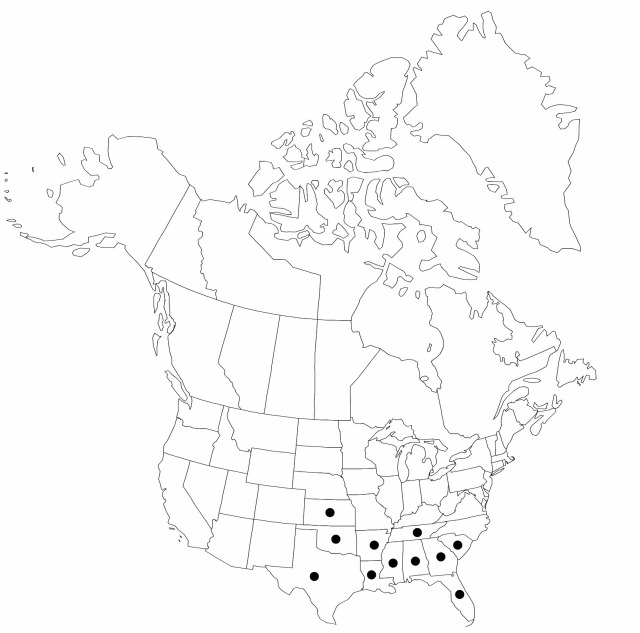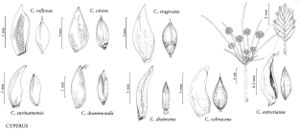Cyperus surinamensis
Descr. Pl. Rar., 20. 1772.
Herbs, annual or short-lived perennial, annuals cespitose; rhizomes absent. Culms 2–6, trigonous, (10–)35–80 cm × 0.5–2(–4) mm, scabridulous with retrorse prickles (infrequently glabrous or rarely also with extrorse prickles). Leaves 3–9, V-shaped, (12–)25–45(–65) cm × 2–10 mm; blades and bracts without cross ribs. Inflorescences: heads umbellate, 10–20(–30) mm diam.; rays 4–12, 1–6 cm, minutely scabridulous with retrorse prickles; 2d order rays often present, 1–2(–3) cm; 3d order rays rarely present, 0.5–1.5 cm; bracts 3–8, approximately horizontal to ascending at 30°, V-shaped to flat, 2–15(–34) cm × 1–4(–5) mm. Spikelets (6–)15–40(–65), greenish white, linear to linear-oblong, (3–)4–12(–15) × 1.5–2.5 mm; floral scales 10–50(–65), laterally pale yellow, light brown, or reddish brown, 2-keeled, medially 3-ribbed, lanceolate, 1–1.5 × 0.8–0.9 mm, distinctly reticulate, often scabridulous near apex. Flowers: stamen 1; anthers 0.5 mm; styles 0.8–1.1 mm; stigmas 0.5 mm. Achenes brown to reddish brown, slightly stipitate, narrowly ellipsoid, 0.7–0.9 × 0.2–0.4 mm, apex apiculate, surfaces papillate or obscurely reticulate to rugulose.
Phenology: Fruiting late spring–early fall.
Habitat: Moist sunny areas with disturbed soils
Elevation: 0–200 m
Distribution

Ala., Ark., Fla., Ga., Kans., La., Miss., Okla., S.C., Tenn., Tex., Mexico, Central America, South America.
Discussion
Cyperus surinamensis is distinguished readily from all other species of the genus in the New World by the usual presence of retrorse prickles on the culms and rays.
Selected References
None.
